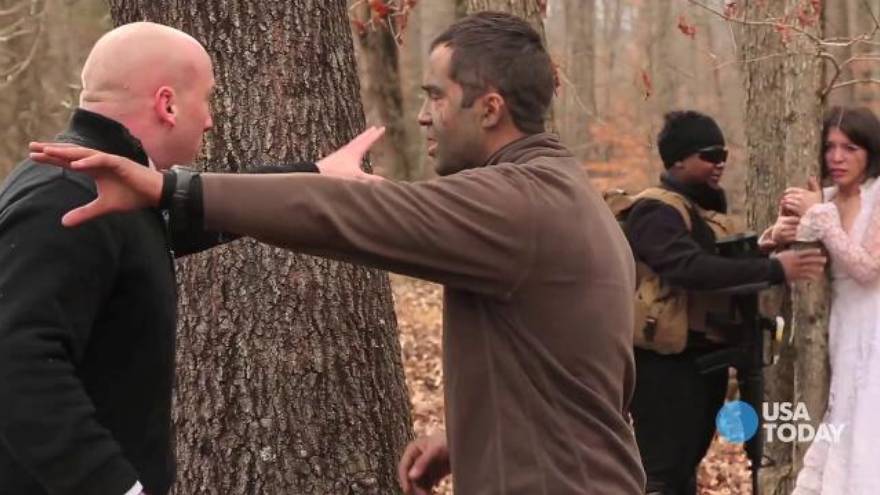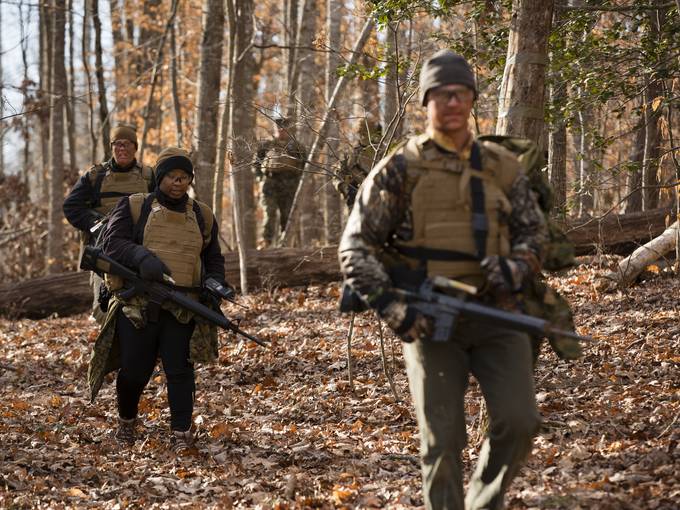SEMPER FI to our Marines. Bravo Zulu.
Executives learn ethics the hard way: From Marines

QUANTICO, Va. – Sunlight was filtering through the trees as the team trudged up yet another hill to the final objective of the morning.
The mission was simple. The team was to meet with a local village priest and establish a relationship.
The plan quickly fell apart when the group realized the solemn ceremony they had been invited to was a forced "wedding" in which a bride whose hands were bound by rope was carried screaming into a tent.
Now they were faced with a choice. Protect the woman from possible harm and alienate an important ally or allow the wedding to take place and avoid interfering in a culture they barely understood.
"I was torn," said Elton Mile, a 28-year-old financial adviser with Morgan Stanley, who led the team.
Mile was part of a group of executives who came to the Marine Corps base here as part of a three-day course to learn ethical leadership from combat leaders. In the wake of the Enron debacle, the collapse of Lehman Bros., Bernard Madoff and other moral lapses, business schools are re-examining ethics training. Traditionally, business schools have taught the skills needed to maximize profits, and given short shrift to softer subjects, such as ethics.
Some executives are turning to the military to fill the gap. The military has long drilled values into their young leaders, emphasizing responsibility and accountability.
Apparently it's paid off. Effi Benmelech, an associate professor of finance at Kellogg School of Management at Northwestern University, co-authored a study completed last year that looked at company chief executive officers who had military experience.
The results were stark. "People who served in the military are less likely to be involved in fraud," Benmelech said. The study looked at the top leaders of 1,500 of the largest publicly traded companies from 1980 to 2006.
The study did not address why that was the case, but Benmelech speculates it is a combination of two factors: People who join the military have a strong value system, and the training in the services emphasizes ethics and responsibility.
Executives out of their element
At Quantico the executives are issued weapons, carry packs and sleep on the cold ground. They had been up since 2:15 a.m., awakened by explosions. The instructors are young officers who have led Marines in Iraq and Afghanistan. The scenarios seem to be inspired by the often ambiguous worlds Marines and soldiers navigated in those conflicts.
"The idea is to make them cold, wet, tired and hungry," said Steven Olson, a professor at Georgia State's J. Mack Robinson College of Business who runs the program that brings executives and students to Quantico for the training. The Georgia State group is one of several relationships that the Marines have established with civilian schools to teach leadership and ethics.
The stakes are rarely as high in the business world as they are in war, where lives are at risk. But that's why the military is uniquely qualified to teach ethics, executives and officers say. It is harder to maintain normal values amid the death and chaos of war.
"What combat does to you is it … corrodes that moral sense that you have about the world," said Marine Col. Todd Desgrosseilliers, commander of The Basic School at Quantico, which is where newly minted second lieutenants are trained before entering specialty schools.
Officers are responsible for setting an ethical tone that will allow Marines to keep their ethical balance amid the chaos of war. "You have to be able to return your Marines back to the United States complete, whole — their characters, their integrity, their moral fiber," said Desgrosseilliers, who earned a silver star in Fallujah, Iraq.
This is not Harvard Business School. The military is used to creating realistic training to prepare men and women for war. The training is designed to be so authentic that it triggers real emotions and fear. There are no right answers.
After one tough scenario in which the executives confronted an angry man waving around a pistol, team leader Chris Dempsey described his course of action as "the least worst decision we had."
"I expected situations, but nothing with this level of realism," said David Lyons, a 56-year-old senior vice president at Wells, a food company.
The priest that Mile's team encountered seemed welcoming at first as he invited the team to view a special celebration. Most of the actors, such as the priest, are second lieutenants training at The Basic School. They take their roles seriously.
The team was thrown into confusion when some men carried a bound and screaming woman into the tent. The woman tore out of the tent and sought protection from other members of the team.
The priest responded by demanding the team give the woman back to her groom and stop interfering in an important religious ceremony, insisting the Americans didn't understand the local culture.
The team was uncertain what to do and debated among themselves as the scene grew more chaotic.
"Please release her right now," the priest shouted. "You are ruining a great day." The bride was sobbing and clinging to a female student.
Eventually the students gave the bride back to the priest, but were clearly uncomfortable with their decision.
"It's legal in their country, so …," Mile said, his sentence trailing off as the woman was dragged screaming back to the tent were the marriage was to be "consummated" amid shrieks.
The Marine officers then took the team aside to discuss what happened.
Mile had wrestled with his decision. "We tried to prevent it, but at what end," he said in response to questions from the instructors. "I didn't feel it was our place to stop an arranged marriage."
Marine Capt. Matt Klobucher challenged his thinking. "So what happened as a result of that decision?"
"She was raped," Mile acknowledged.
Other students pointed out that they were powerless to change a culture that believes in forced marriages, and even if they stop this one incident it won't change the culture that allows it.
"But this is the first time you had an opportunity to do something about it," Klobucher countered.
Business students are often surprised to find that the military is not the rigid hierarchical organization they had expected. Instead, officers are taught to think for themselves.
Ironically, it is the civilians who try to fall back on the rule book when struggling for a decision, Olson said.
"They want to fall back on the narrow technical definition of the mission they receive from higher, just like they do in the corporation," Olson said. "They can't believe the Marines shove it back in their face and say, 'Wait a minute. You're falling back on the rules, and you've missed the values and the ethics in play here.













